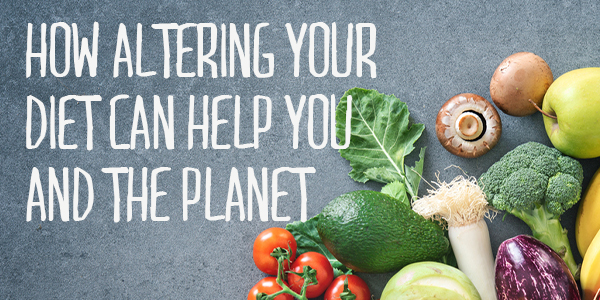How altering your diet can help you and the planet

With the British Nutrition Foundation holding its 10 year anniversary of ‘Healthy Eating Week’ this June, it’s time to talk about our food diets and how we should be educating children about healthy eating.
Having a balanced diet is more important than we take credit for. Following the World Health Organisation’s recommended ‘5 a day rule’ of eating five portions of fruit and vegetables in total every day, you lower the risk of developing serious health problems such as heart disease, stroke and some types of cancer.
Research done by the NHS in the past, however, has shown that many children do not consume the recommended 5-a-day.
The percentage of people in England that are obese has also increased in the last 10 years.
Sara Stanner, science director at British Nutrition Foundation, said: “When Healthy Eating Week launched in 2013, 67% of men and 57% of women in England were classified as overweight or obese.
“This number is now 68% and 60% respectively and obesity levels among children are also rising.
“So, it’s clear more work needs to be done and raising awareness of how to achieve healthy eating and lifestyles needs to remain a top priority.”
There are many causes of obesity, such as genetics, stress, health conditions and medications, however, the NHS agrees the general cause is eating too much and moving too little. It develops gradually and is often a result of poor diet and lifestyle choices.
For example, processed and fast food are loaded with fat and sugar, which will eventually lead to weight gain if consumed in repeated and regular quantities. Consumption of sugary soft drinks and fruit juice are also leading causes in obesity.
It is agreed that the best thing for anyone to drink is some good old-fashioned water. Water is free of calories, free of caffeine, free of alcohol, and does the best job of hydrating you. If you add just 1 to 3 cups of water a day to your diet, you could end up taking in less fat, salt, sugar and also less calories.
The roots of Healthy Eating Week lie in engaging children and young people with healthy lifestyles. On average, there are more than 5,600 school and nursery registrants in the UK each year.
Universities, workplaces, families and individuals are now welcome to take part, with resources and activities tailored to different age groups and demographics.
The week is focused around five daily challenges, supported by a series of informative, evidence-based resources and fun activities suitable for the classroom to take on. The Healthy Eating Week 2022 challenges are:
• Focus on fibre – for meals and snacks
• Get at least 5 A DAY – put plenty on your plate
• Vary your protein – be more creative
• Stay hydrated – fill up from the tap
• Reduce food waste – know your portions
David Harding, headteacher at Hinckley Parks Primary School, said: “At Hinckley Parks we are always keen to promote healthy food choices and healthy lifestyles.
“The British Nutrition Foundation’s Healthy Eating Week allows us to do this perfectly and enables us to build on the work which takes place throughout the year.
“The children learn about different food groups and what constitutes a healthy diet and are provided with opportunities to prepare, cook and eat healthy dishes.”
Speaking of healthy dishes, why not try making one? Specially chosen for our Educate readers by the British Nutrition Foundation, you can try making this delicious dish with your children!
Introducing cooking to children at a young age not only establishes family time without disrupting your routine, but also teaches them a basic but major life skill!
Ultimately, children do not decide what goes in their lunch box, nor do they choose what the family has for dinner. By making sure your child eats a healthy, balanced diet every day, you are not only benefiting them and teaching them what they should be eating regularly, you are also helping the planet and the lives of everyone around you.
If you want to find out more about Healthy Eating Week 2022 and register, click here: www.nutrition.org.uk/ healthy-eating-week/


, nuts and seeds – we can improve our own health and reduce our environmental footprint too.</p>
<p>“In addition, food waste accounts for as much as 10% of total greenhouse gas emissions globally, therefore, raising awareness about how people can wasteless and reuse more is essential.”</p>
<div class=)




